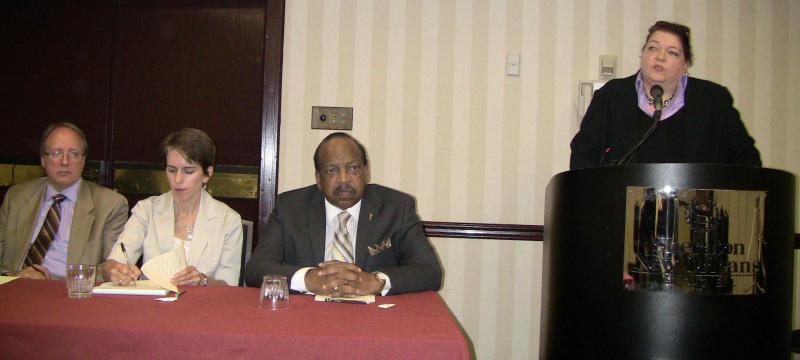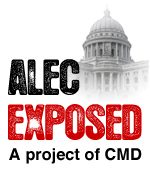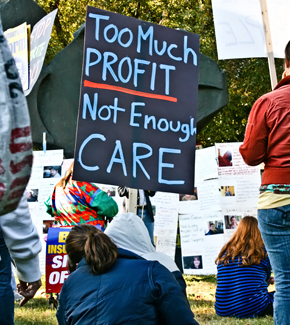Journalist Kicked out of ALEC Conference, Threatened With Arrest
In late July, shortly after the launch of ALECexposed.org, Lousiana State Rep.Noble Ellington, a Republican from the state's 20th district and the national chairman of the American Legislative Exchange Council, spoke to NPR about the recent spate of criticism leveled at his organization. When discussing the behind-closed-doors process used to craft ALEC model legislation, Ellington dismissed concerns raised by NPR, assuring interviewer Terry Gross that the public "have an opportunity to talk to their legislators about the legislation -- so I don't see how you can get more transparent than that."

 The event, hosted by People for the American Way and moderated by Center for Media and Democracy Executive Director Lisa Graves, was held directly across the street from
The event, hosted by People for the American Way and moderated by Center for Media and Democracy Executive Director Lisa Graves, was held directly across the street from  On August 3, the
On August 3, the  It only takes three words, when you get right down to it, to describe the real of those folks: profits over people.
It only takes three words, when you get right down to it, to describe the real of those folks: profits over people.
 If opponents of health care reform could view the grant money in the Affordable Care Act as an investment in our children rather than wasteful spending, I believe at least some of them would eventually accept that we're better off with the law than without it.
If opponents of health care reform could view the grant money in the Affordable Care Act as an investment in our children rather than wasteful spending, I believe at least some of them would eventually accept that we're better off with the law than without it. (Editor's note: The Center is deeply grateful for all the research into ALEC politicians underway, especially by Daily KOS bloggers, and we are offering the tips today in light of the many questions people have asked about how to help with this research.) The Center for Media and Democracy recently unveiled a trove of "model" bills voted on behind closed doors by corporations and politicians through the American Legislative Exchange Council (ALEC). Many of these bills and provisions have been introduced in state houses across the country without any mention of the ALEC connection and have become legally binding. In addition to the analysis of the more than 800 pieces legislation on "
(Editor's note: The Center is deeply grateful for all the research into ALEC politicians underway, especially by Daily KOS bloggers, and we are offering the tips today in light of the many questions people have asked about how to help with this research.) The Center for Media and Democracy recently unveiled a trove of "model" bills voted on behind closed doors by corporations and politicians through the American Legislative Exchange Council (ALEC). Many of these bills and provisions have been introduced in state houses across the country without any mention of the ALEC connection and have become legally binding. In addition to the analysis of the more than 800 pieces legislation on "